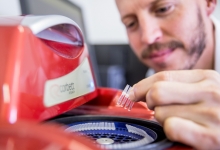Wastewater sludge management, reuse and treatment
While centralised methods of wastewater and sludge treatment technologies have improved the sanitation services provided to humanity, it has brought about a shared responsibility in terms of ensuring that the collection points of faecal matter are well designed and processes carefully arranged.
The aim of the CSIR’s wastewater research and development is to identify common challenges relating to municipal wastewater treatment works, industrial effluents and effluents that result from mining activities. Inefficient management of wastewater streams results in environmental degradation and disease outbreaks. Continued research and innovation is required to improve existing infrastructure design and treatment processes. One of the key areas to investigate is the large amounts of sludge produced at municipal wastewater treatment works.
The CSIR has a large, multidisciplinary research team that works on long-term solutions for wastewater challenges. Projects undertaken include the production of biogas from wastewater sludge, treatment of water and wastewater using low energy consumption technologies, use of a low-cost algae system that facilitates effective and efficient removal of nutrients and pathogens at wastewater treatment works, real-time monitoring of wastewater quality at wastewater plants, as well as low-cost materials for the treatment of acid mine drainage. Researchers in these fields have conceptualised and developed technologies that are ready to test under robust conditions. Different approaches for sludge reuse is also under investigation with a view of turning the burden of sludge management into an economic value-add for the various municipalities.


